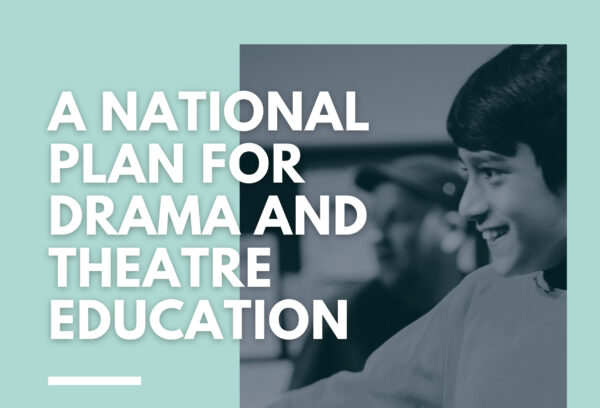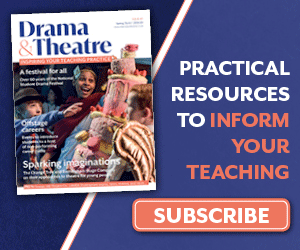National Drama has this week written to the Rt Hon. Nick Gibb, MP, Minister for Schools, to express our disappointment that the Arts Premium, promised to schools in the Budget 2020, is now being reviewed in the Autumn spending and will not be allocated to schools in September 2021 as promised. We have also taken this opportunity to express our concern about the lack of recognition of the arts as part of educational recovery, in the most recent DfE document ‘Teaching a broad and balanced curriculum for education recovery’, and through not allocating the recommended funding for recovery as suggested by Sir Kevan Collins.
Please read National Drama’s full letter below, and we encourage all members and supporters to contact their own MP about these issues.
Dear Mr Gibb
National Drama wishes to express its disappointment and concern that the funding for the Arts Premium, confirmed in the 2020 budget, is now no longer being distributed to schools in September 2021. National Drama also wishes to raise concerns about the mixed messages coming from the Government regarding support for arts education in schools, despite a wide body of evidence of how important arts education is to young people. As I’m sure you are aware, National Drama is the UK’s professional association for Drama education and member of the Council of Subject Associations.
Budget 2020
In March 2020, the Government confirmed in the Budget Report that £90 million would be provided for:
“…an Arts Premium from September 2021, averaging out as an extra £25,000 a year per secondary school for three years. The funding will help schools to provide high quality arts programmes and extracurricular activities for pupils, including those delivered in partnership with arts organisations, as well as supporting teachers to deliver engaging and creative lessons in the arts”
Source: https://www.gov.uk/government/publications/budget-2020-documents/budget-2020
Our members and their schools have already planned how to use this funding to improve access to the arts in order to increase the cultural capital, progress and outcomes of all students.
We have been following the Parliamentary Record, particularly the questions from the Earl of Clencarty regarding the Arts Premium, to which Baroness Berridge replied that:
“…the Government have had to make some difficult fiscal decisions on the arts premium. As noble Lords are aware, we have no money for free schools this year. That, along with the arts premium, will be in the spending review in the autumn.” (Hnasard, 7th June 2021)
We are extremely disappointed that the Government have withdrawn this funding commitment, and whilst we acknowledge that the Government have had to make difficult decisions regarding where to prioritise funding for educational recovery, we find it extremely disheartening and short-sighted that there is a lack of support for the arts, when the Government have previously said that the arts are “vital parts of children and young people’s education.” (Baroness Berridge, December 2020)
Drama’s Role in Educational Recovery
The former Education Recovery Commissioner, Sir Kevan Collins, said educational recovery had to provide opportunities for children and young people “to play, to engage in competitive sport, for music, for drama because these are critical areas which have been missed in their development” – and therefore the funding package of £1.4 billion for schools, compared to the £15 billion Sir Collins suggested was needed, is also an extremely disappointing outcome, and leaves very little hope that any funding can be spent on arts education. Whilst Ministers may say that schools can spend the funding however they like, it is extremely unlikely that schools will choose to spend the very limited recovery funding on the arts when they need to prioritise catch up in core subjects. The funding is simply not enough, and the support is not there, to allow the arts to have a place in educational recovery.
When questioned about support for the arts in schools, Ministers have responded with the many examples of support given to Music education, such as the £80 million investment in Music Education Hubs, and whilst we grateful for this support for our Music colleagues, there are no similar support packages offered for Dance or Drama education. As the national subject association for Drama, we feel it is our duty to reinforce how vital Drama is as a subject for all young people to have access to, especially after the period of the pandemic. Drama plays a vital role in freedom of expression and democracy. There is an increasing body of evidence supporting the importance of the arts in contributing to positive mental health and wellbeing (Grossi, et al. 2010 & 2012; Konlaan, et al. 2000; Leadbetter & O’Connor, 2013; Mowlah, et al. 2014), but there is also a significant body of research on Drama specifically developing skills in empathy, collaboration, a sense of community, confidence, and resilience.
In July 2021, the DfE released a document entitled “Teaching a broad and balanced curriculum for education recovery” giving recommendations, and again Drama was notably and disappointingly absent from this 36 page report, despite the strong body evidence suggesting how Drama can be beneficial for children and young people’s social, academic and emotional development.
Support for Arts subjects
On 7th June, in response to questions about the Government’s support for the arts, Baroness Berridge stated that “since the introduction of the EBacc, the take-up of GCSEs in the arts has remained broadly stable,” (Hansard, 7th June 2021) and we feel that it is important to point out that this is simply not true. The English Baccalaureate was introduced in 2010, and the Cultural Learning Alliance data shows that there has been a 37% decline in arts GCSE entries 2010 to 2020. There have also been declines in numbers of entries at A Level, numbers of arts teachers in schools, and numbers of hours dedicated to arts teaching (CLA, 2020). We are extremely concerned that due to the COVID-19 pandemic, this situation is worsening, with members and colleagues reporting that GCSE options choices have been reduced, students have missed out on many hours of practical arts teaching, and uptake has significantly decreased due to students not having experienced arts subjects properly since 2019. These factors, combined with a lack of extracurricular opportunities, and lack of access to the theatre industry due to closure, puts our subject in a perilous position. We need the Government’s support to “build back better” in arts education.
Recognition of the contribution of arts subjects to the UK economy
It is well known how much the arts and cultural industry contributes to the UK economy (data from CEBR states £10.8 billion a year, 2019) and therefore it is imperative that we can continue to deliver a broad suite of arts subjects to support the next generation of theatre makers and theatre goers. As educators we also have a responsibility to provide a broad and balanced curriculum; to develop cultural capital; and to close the gap for disadvantaged students – ensuring that all students, from all backgrounds, have access to a high quality compulsory arts education taught in school, on the curriculum, by specialist teachers. Arts education cannot be just available to the elite, who can afford extracurricular classes, or taught by external visiting practitioners. Arts education should be a right afforded by all, and we urge the Government to make its message of support for arts education clearer, to invest properly in arts education, and to see arts education as a vital part of educational recovery post-pandemic.
In conclusion, National Drama makes the following requests:
- National Drama urges that the value and benefits of Drama and its position in a truly ‘broad and balanced’ curriculum are formally recognised in all DfE guidance and documentation going forwards.
- National Drama calls upon the Government to implement the recommendations of the Education Recovery Commission with the full recommended funding.
- National Drama requests that Drama’s inclusion in the National Curriculum be urgently reviewed in light of the Covid-19 pandemic and the strong body of evidence for inclusion set out in this letter.
Yours sincerely,
The Executive Committee of National Drama
References:
Cebr, 2019. Contribution of the arts and culture industry to the UK economy. Online. Available at: https://www.artscouncil.org.uk/sites/default/files/download-file/Economic%20impact%20of%20arts%20and%20culture%20on%20the%20national%20economy%20FINAL_0_0.PDF
Cultural Learning Alliance, 2020. Briefing: Hours of arts teaching and number of arts teachers in England’s secondary schools stable but not recovering after years of decline. [online] Available at: https://culturallearningalliance.org.uk/wp-content/uploads/2020/10/Arts-teaching-hours-and-workforce-2020.pdf
Grossi, E. et al. ‘The impact of culture on the individual subjective well-being of the Italian population:
an exploratory study’ Applied Research in Quality of Life 2010, 6(4) pp.387–410
Hansard, 7th June 2021, HL. Secondary Schools Arts Subjects. [online] Available at: https://hansard.parliament.uk/lords/2021-06-07/debates/39AA8B7D-9DDC-46D4-9AA8-9AC21AC55AD2/SecondarySchoolsArtsSubjects
Konlaan, B. et al. 2000‘Visiting the cinema, concerts, museums or art exhibitions as determinant of survival:
a Swedish fourteen-year cohort follow-up’ Scand J Public Health 2000, 28 pp.174–178
Leadbetter, C. and O’Connor, N. 2013. Healthy Attendance? The Impact of Cultural Engagement and Sports Participation on Health and Satisfaction with Life in Scotland (Scottish Government Social Research
Mowlah, Andrew, Vivien Niblett, Jonathon Blackburn and Marie Harris (2014) The Value of Arts and Culture to People and Society. London: Arts Council England.





1 thought on “National Drama’s letter to RT. Hon. Nick Gibb MP, Minister for Schools”
Perhaps if we put in a request for new wallpaper for our theatres, cinemas and concert halls we may get the finance we are entitled to. ARTS MATTERS.
Comments are closed.